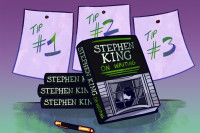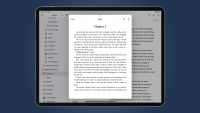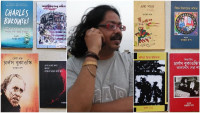
Publish and be cancelled
thecritic.co.uk – Wednesday June 8, 2022

Unreadable and insufferable woke academics are boycotting the publishers that grudgingly print their inane work
Why do publishers publish the books they do? The answer seems obvious: they publish what they think will sell because they have to make money, unless they have the luxury of being some heavily subsidised university press, or a publisher of poetry (“the invisible link that connects literature and poverty”, to adapt Hazlitt). Most will, to some degree, specialise in certain areas — be it in terms of subject matter, type of book or both — because one needs to know a market well and establish one’s presence in that market before one can realistically expect to make money, or at least keep afloat.
Ultimately, however, that is really no answer. Inevitably, the personal interests, contacts, judgement and worldview of the editors and publishers involved will be the most fundamental factors that shape the output of a publisher, even if commercial considerations always remain a limiting factor.
Any press needs its share of bestsellers, but it’s far from unknown for publishers to take on individual books that they calculate are likely to lose them money, or at least are unlikely to be very profitable, for a whole number of reasons: perceived prestige or reputational enhancement, personal commitment to a cause, whimsy — and so on. Certainly, a pure, abstract desire to make money is not the major factor (if riches beyond the dreams of avarice are one’s aim, then publishing will be a life-long disappointment).

Why I Make Rules for My Writing Students—And Why I Break Them
lithub.com – Wednesday June 8, 2022

The legendary golfer Jack Niklaus has an unorthodox philosophy when it comes to teaching kids how to play the game. Most instructors want to build a young golfer’s swing from the bottom up, drilling them on the fundamentals, but Niklaus recommends letting kids swing as hard as they can. Don’t clutter their minds with rules. Don’t tell them how to grip the club or how to stand. Don’t demand that they keep their front arm straight, their head down. There will be time for all that.
When they’re just starting out, what’s important is that they have fun. Let it rip. They might miss the ball, top it, slice it, hook it, but who cares—they’re learning what works for them. Their muscles are figuring out their own way to swing. They’re developing their own style.
When I started teaching high school English ten years ago, my plan was to be the Jack Niklaus of writing instructors. I’d let my students let it rip. I’d give them the freedom to write what they wanted, in whatever genre they wanted, in whatever form they wanted. Which I did. And which I still do, more or less. I teach an advanced Creative Writing class to seniors, and they can submit prose, poetry, drama—whatever they’re into, we’ll workshop it.
But here’s what happened over the years: my students kept making the same mistakes, using the same broken tools. It was like watching a seven-year-old golfer shank the ball into a pond again and again, scaring all the frogs. The golfer gets frustrated. You get frustrated. The frogs get frustrated.

Trauma is everywhere. Write about it anyway.
theatlantic.com – Sunday June 5, 2022

Every day—through TikTok, Instagram, and Zoom—the internet forces us to think about how we present ourselves to the world, giving us endless opportunities to construct our identities anew. Little wonder, perhaps, that the personal feels ubiquitous in contemporary writing, too, with a slew of publications that draw from, or appear to draw from, the lives of their authors. (Think of the novels of Douglas Stuart, the essays of T Kira Madden, and the poems of Ocean Vuong, all writers who mingle personal experiences with exceptional creative writing.) But in the past few years, I’d argue that another driving force has been behind much personal writing: the many traumas of recent vintage, including the pandemic, racist violence, and the mental-health crisis. As these events have piled up, my writing students have become more interested in rendering their own experiences—especially the painful ones.
Melissa Febos is at the vanguard of this particular boom in confessional writing, and she is the guide I point my students to when they want to write in this style. She’s best known for her nonfiction: Whip Smart, Abandon Me, and last year’s Girlhood, a masterful analysis of growing up female, which won the National Book Critics Circle Award for Criticism. Febos is an engaging, cerebral writer who mingles what might seem like familiar ingredients—research, interviews, cultural critique, and personal anecdotes—in surprising ways. Her latest book is Body Work, an essay collection that sets out to teach the craft of personal writing by not only showing us how to capture the difficult, intimate details of our lives, but also arguing for why we should pursue the practice in such a challenging time.

3 Best Tips From Stephen King’s ‘On Writing’
studybreaks.com – Friday June 3, 2022

There is no one right way to write, but to write well requires some semblance of a structure. The process of writing, the tools at a writer’s disposal and combating the dreaded scheduling pitfalls are all at the discretion of the aforementioned writer. Before taking on the monumental task — in the eyes of any aspiring author — of typing the first sentence of a story, there lies the inescapable (at least for now) dilemma of how one could even begin to write.
The physical necessities for writing are all there: a computer or for the old-fashioned, a pencil and paper, a quiet room calibrated to any atmospheric preferences and zero interruptions. But without a set-in-stone process or pre-established idea of a story’s premise, there’s little point in writing at all, at least, according to Stephen King’s 2000 memoir and how-to-guide, “On Writing.”

How to write a novel in Ulysses on iPadOS
techradar.com – Thursday June 2, 2022

Writing a book, whether it’s fiction or fact, is a challenging and daunting task, and it makes sense to use every tool at your disposal to make the job easier.
While traditional word processors have always been a popular choice, we now have apps more tailored to large and complex writing projects, and one of the premier examples is Ulysses.
Ulysses(opens in new tab) is a Markdown(opens in new tab) writing environment, which means you write in plain text, using some simple punctuation to apply styling. The syntax will be familiar to almost anyone who’s written a text message or a tweet; for example, you can surround a phrase with underscores for emphasis, use double-asterisks for boldface, or use hyphens to make a bulleted list. Ulysses also offers controls to apply the styling for you but it's all easy to learn.

Wallace Stegner and the Trap of Using Other People’s Writing
newyorker.com – Thursday June 2, 2022

For years, troubling charges—appropriation, plagiarism—have hovered over Wallace Stegner’s famous novel, “Angle of Repose,” the story of a mining engineer and his wife living in the American West during the late eighteen-hundreds. There’s no question that Stegner used the life of the writer Mary Hallock Foote as the basis for his novel, nor that he used passages of her work without attribution, but at first few people knew it. In 1971, when Stegner’s novel was published, Foote’s memoir was unpublished. When her book came out the following year, Stegner’s novel had won the Pulitzer Prize, and it was protected by a halo of esteem.
But charges began emerging in the late seventies. In 2000, in an introduction to the novel, Jackson Benson, Stegner’s biographer, defended Stegner’s inclusion of thirty-eight passages from Foote’s letters, “approximately 61 pages,” all without attribution. It’s “a brilliant tactic,” Benson says, that creates “an invaluable part of the novel” and provides “depth and authenticity.” As to Foote’s life, Benson says the family had encouraged Stegner to use the material, believing that Stegner would tell the story of Foote’s productive career and happy marriage. In a preface, Stegner wrote, “This is a novel which utilizes selected facts from their real lives. It is in no sense a family history.” But it was recognizably a family history—one that distorted the lives it described. More recently, a persuasive essay by Sands Hall, in the journal Alta, accuses Stegner of plagiarism, the appropriation of Foote’s life, and the slandering of her name. Instead of hewing to the historical facts, Stegner fabricates an adulterous liaison for the character based on Foote, a transgression that costs the life of a child and destroys her marriage. Some people who knew about Foote assumed that’s what happened in her own life, when it did not.

Publishers scared of cancel culture made me rewrite my book, says Anthony Horowitz
telegraph.co.uk – Sunday May 29, 2022

Anthony Horowitz was told to rewrite his latest children’s book and remove jokes because publishers were terrified of cancel culture, he has claimed.
The best-selling author said children’s publishers were “more scared than anybody” about causing offence, and he was given a list of things he “could and couldn’t say” regarding gender or ethnicity.
He suggested that the industry take inspiration from Ricky Gervais, who has defied the “shrill voices” of Twitter to make jokes about the trans debate.

Maggie Shipstead on Dealing with Mistakes in Writing
lithub.com – Sunday May 29, 2022

Maybe five years ago I read a novel in which a man drowns in a lake, and, a few minutes later, his body is found floating on the water’s surface.
If any of my writer friends are reading this, they’re probably groaning because they’ve heard me harp on this example before. What can I say? Sometimes I’m irritating and pedantic. But here’s the thing: it doesn’t make any sense for that body to float. If bodies were inherently buoyant, no one would ever drown. For that scenario to work, the man’s lungs would have filled with water, pulling him under and killing him, and then, almost immediately, something — the condition of death? — would have sent his body rocketing back up to the surface, where, despite being heavier now than before, he floated. No. Bodies float because gases of decomposition eventually lift them. The process takes time: at least a couple days even in relatively warm, shallow water, longer in colder, deeper water. Many bodies never surface at all. But the image of the floating body is pervasive in our culture and our entertainment (“We’ve got a floater,” says one TV cop to another), so familiar that a writer may skip directly from drowning to floating without stopping to think.

The one line that's missing from all the writing advice
bookriot.com – Tuesday May 24, 2022

I started writing as an adult in 2009. I’d scribbled many poems and “novels” as a child and teen, but I had a West Wing-based epiphany in my early 30s (it’s a long story) and started writing seriously then.
Alongside the joy of getting to know my characters and daydreaming a plot into existence, I also read a lot of books on the craft of writing. Studying, I could do. I know school isn’t for everyone, and that I benefit from a lot of white and neurotypical privilege, but I loved school. Looking back now, I think part of what I loved about it was the (mostly) reliable nature of it. I grew up in Belgium in the 1980s, and there was a lot of listening to teachers, making notes neatly in my exercise books, learning things by heart for tests and reciting them at the chalkboard. I was good at following rules, and I liked the fact that a certain kind of input meant a certain kind of mostly predictable output.
I knew, of course, that art is less predictable than that. It was also apparent early on as I started writing that I thought outside the box of what fiction, at least British and American fiction, requires to be considered publishable. But still, if pressed, I would have said that learning my craft and persevering would eventually result in publication. I knew that it might be a long road (five years, maybe!), but if I learned about how to submit to agents, I would eventually find my place in the publishing world.

Little magazines in Instagram era, a tete-a-tete with independent writer Subhankar Das
indiablooms.com – Monday May 23, 2022

Welcome to the world of little magazines, mimeo editors, outlaw poets, chapbooks and experimental writing. IBNS caught up with Subhankar Das, an independent writer, literary activist, poet, blogger, publisher and film producer, to answer some of the questions pertaining to the future of little magazines and small publications in the era of Instagram.
The Little Magazines movement is a world of its own where unknown writers, unpublished poets and unsung litterateurs and activists share their literary exertions and thoughts with well-knit think alike groups spread across the globe.
But how is this child of the mimeograph revolution of the 60s and 70s coping up with the ever-evolving digital universe where the rules of publication and the way we share information have vastly changed. Is digital revolution an existential threat to Little Magazines or will it bring boundless opportunities and unlock limitless creativity?
Get the free newsletter | Submit a news item or article | Get Writers' News for your website





